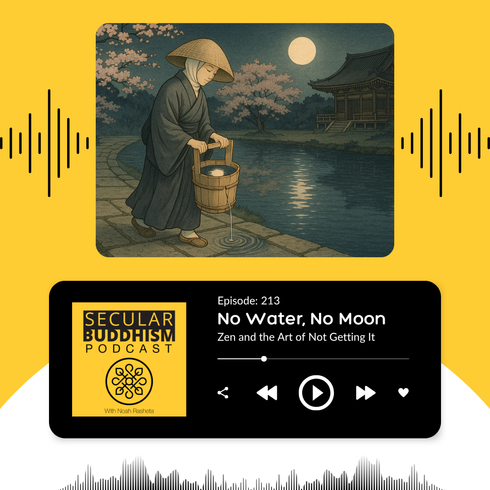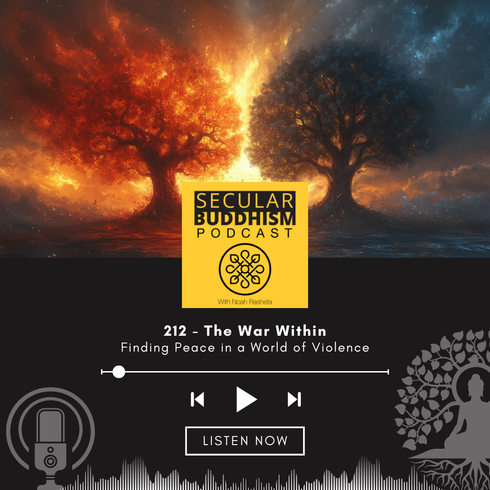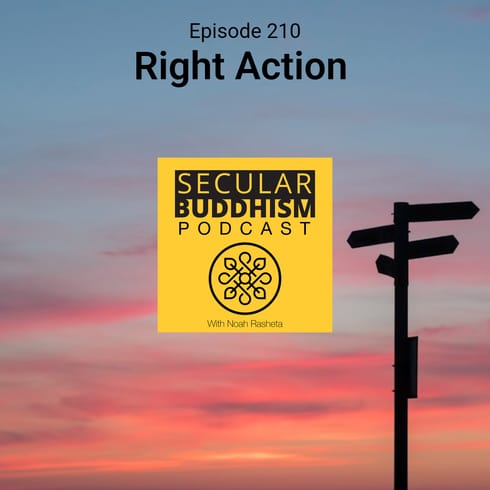
86 - Listening to Understand
We seem to really struggle when it comes to having conversations about difficult topics. Are we listening with the intent to understand the other person or are we simply assessing to determine what team the other person is on? Are they team “us” or team “them”. In this episode, I will discuss the idea of listening to understand.
Subscribe to the podcast on:
iTunes – https://itunes.apple.com/us/podcast/secular-buddhism/id1071578260
SoundCloud – https://soundcloud.com/secularbuddhism
TuneIn – http://tunein.com/radio/Secular-Buddhism-p823114/
Stitcher – http://www.stitcher.com/s?fid=80132&refid=stpr
Transcript:
Hello and welcome to another episode of the Secular Buddhism podcast. This is episode number 86. I am your host, Noah Rasheta. Today I’m talking about listening to understand. Before I jump into that, keep in mind the Dalai Lama’s advice to not use what you learn from Buddhism to be a Buddhist, use it to be a better whatever you already are.
I had a recent experience where I was asked about my view or stance on a controversial topic, and in that moment I felt a sense of hesitation on my part in deciding how to answer. And, this experience got me thinking about the nature of the question. Was this being asked in order to truly gain a better understanding of my views or was it just a test of some sort to see what team I’m on. Now, imagine for a moment any of the hot topics of the day, it could be political questions like, what are your views on immigration? What is your stance on gun control? Moral or ethical questions like, what do you think of abortion? Are you a vegetarian? Why do you eat meat? Or existential questions like, do you believe in God? What do you think happens when we die? And of course we can’t leave out the hot topic of the season, you know, what are your thoughts about the Christmas classic, “Baby, It’s Cold Outside?”
Now, as I thought about the specific question that I was being asked, it occurred to me like I said that perhaps I was being subjected to a test. Was this question just a simple assessment of whether, or not I’m on team us, or team them, and this got me thinking, how often are we making these assessments against others? For me, how often am I really listening to understand? And, I mentioned before in a previous podcast episode, episode 73 titled, “What Moves Us,” the five core social motives. With the first one, number one being, belonging. That is to say that, one of the core social motives is to make an assessment of belonging. I’m trying to determine whether I belong. I need to decide what team you’re on, and can you see how this plays out if we’re all doing this assessment all the time? Do you do this in your own life?
I do this all the time and I think we all do, and some topics are more sensitive than others. I know for me it centers a bit more around like religious affiliation, or are more clearly I’m trying to determine the level of religious dogmatism or fundamentalism that one possesses, and that’ll hit a sensitive nerve for me. So, I think it stems from the fact that I tend to feel like, that is a particular team that I no longer belong to. A team that often gives off this vibe of, “Hey, you’re a trader, you were one of us and now you’re not.” Or, “You’re a weak person, because you’ve lost your faith.” Or, I don’t know, anything along those lines. So, it seems easy for me that when it comes to religious topics or questions of a religious nature, I catch that I’m generally listening to assess for belonging rather than listening to try to understand, and that’s just something that I’ve noticed about myself.
Again, what we’re trying to do with all of this as a practice is internalize it. You take all this information that you’re hearing on the podcast and this is about you saying, “Okay, well how does this apply to me? In what areas of my life am I struggling to listen to understand?” Now, I want to emphasize that we’re hardwired to do this for survival reasons. Back in the old days, the evolutionary days, if we weren’t good at this simple assessment, it could have meant the difference between life and death. In other words, I’m not saying that this is a bad thing that we do, I’m just saying it’s not the most skillful way to communicate around these difficult topics when we’re all playing the game of just trying to see, what side were each on, and then we ostracize, or invalidate the other view, or the other opinions so quickly.
Now, it’s unfortunate, but I think in our culture we’ve been taught to avoid talking about controversial topics, because it makes both sides too upset, it makes people uncomfortable to talk about it. We end up getting carried away by the aversion that we have to the discomfort of these emotions that arise when we’re talking about these things. When instead, we should be focusing on learning how to have skillful conversations about difficult topics. Now, I get it that you can’t change other people. This isn’t about convincing someone else to be better at talking about difficult topics that are controversial for them. This is about you deciding and learning, can I personally become better at having skillful conversations around difficult topics? How do we do that?
Well, first we need to learn to listen to understand, and when we’re seeking to understand, it’s important to know that we’re not trying to debate the validity of another person’s view, or their opinion, or their belief, we’re just trying to gain a bigger picture. And, Thich Nhat Hanh says, “Understanding is loves other name,” and I really like that quote. I’ve mentioned it before in another context where he talks about how the more we understand, the more we love and the more we love, the more we understand. I think that’s something important to keep in mind. One of the most powerful things that we can do individually to become better at having skillful conversations around difficult topics, is first to recognize that we’re not experts at everything. I don’t understand why we all feel the need to be experts at everything. All of I do, everyone does, and in reality there are very few things that we are experts in.
Perhaps, it could be your career or something that you spent a considerable amount of time learning. That’s your area of expertise, but then there are so many other areas that are not your area of expertise. And for me, I know when someone asked me to talk about my views on, I don’t know, say immigration as an example, it’s like, well, why would you want to know what my opinion is? I mean, sure, I have one and I may feel strongly about my opinion, but that by no means makes me an expert on the topic. My view or my opinion may be wrong no matter how right it feels to me. And, wouldn’t it be nice if we all carried that attitude, that a bit of wiggle room that, my view may not be the right view.
In my personal practice with Buddhism, I’m constantly trying to understand myself, why do I do what I do? Why do I believe what I believe? Why do I not believe what I don’t believe? And, to view things the way that I view them. I understand that, I am the product of the societal views that I grew up with. With all my past experiences and the opinions that arise out of all of this, but that doesn’t mean that they’re right. It doesn’t mean that they’re better than other views or other opinions, and I try to keep that in mind. To acknowledge that there may be better views, or better opinions out there. In fact, that’s why I am where I am with my views, because at one point I measured or analyzed the views that I had with other views and thought, “Oh, these other views seem to make more sense to me.” So, I shifted and evolved in, and that’s led me to this current moment in space and time, where the collective views and opinions that I have are the ones that I have.
But to become stagnant and think, “Oh, well, now I got them all. This is …” No, it continues to evolve and I’m continually assessing my views and my ideas to other views and other ideas. So, there may be better views out there, and I want to hear about those. I want to listen to other views and understand them more. And, I want to be clear about this, that this doesn’t mean that we’re tolerating or condoning harmful views, harmful ideas, harmful opinions, but I think we can learn to engage more skillfully with opinions that we don’t like, opinions that we disagree with. But again, this whole process really starts with us. So, this episode of, are we listening to understand, it’s an invitation to ourselves. But, it also turns into an invitation to assess how others are listening to ourselves. If somebody comes to me and they’re asking me a question that’s on a hot topic and I get the sense that they want to understand my view, I would happily sit and discuss it and have a civil conversation about a difficult topic.
I think that would be relatively easy, but it would be very difficult if I sense that that person is not listening to understand. They’re listening to assess and listening to decide whether, or not I am one of them, or I’m the enemy, if I’m on the other team. And, if that’s the case, I personally feel like, well, what’s the point of playing that game? The moment I make it clear to you that I’m on the other team, I’m not sure I’m going to stand firm about specific views and ideas that I hold. But, there may be instances or circumstances where I think, “Well, I don’t think you need to hear my view on this, because it’s just my view and that’s it, and we don’t really need to get into it. You’re just going to view me as your enemy if I elaborate on this. So, why elaborate on it? Let’s just …”
Or the other thing that I’ll do often is, be honest and say, “I don’t know. I feel like it could be this or that, but the truth is I don’t know. So, I’m open.” And, that creates space for the person who’s assessing you to think, “Okay, well, that I can discuss this more with them.” And, you can develop your strategy, see what works with you and what works with different people. I mean, this is different with friends than it is with family, different with close family, like a spouse or a partner than it is with maybe a distant cousin or something. But, again, I think that the invitation here, the challenge for this week is to notice what is your default style of listening? Are you listening to understand, or are you defending your opinion perhaps with more zeal and more energy than maybe skillfully required for the goal that you’re trying to achieve?
What, if the goal of our conversations was to understand each other, rather than to a figure out who is more right than the other, or how I’m to convince you to view the world like me. So again, those were just the ideas I wanted to share around this topic, but the next thing I wanted to share is an item of news, and that is, in the past, I’ve done these trips to Uganda, humanitarian mindfulness trips. I’ve done two of them. And then I took a break, rather than planning to do another one, I held off because I’ve had in the works this tentative idea to do a trekking mindfulness trip to Nepal. And, I’m excited to announce that, that is now officially going to happen November 15th of 2019. So, we’re still 10 months out, there’s plenty of time to think about this, but what I want to do is, an adventure trekking/mindfulness retreat.
Now, why Nepal? Nepal has a lot of significance for Buddhism. It’s where the Buddha was born. What is today Nepal back then it was India. There are many temples and pilgrimage type sites, but what I want to do is actual trekking. Nepal is world famous for its trekking and one of the regions there is called the Annapurna range. And so, what I’m proposing to put together, and if any of you are interested keep listening, is a 15 day itinerary where we would start in Kathmandu and then we would do a 15 day a trek. Everyday we trek to a new little town where we stay and this would be, a part mindfulness retreat where every morning there would be group meditation, guided meditation, silent meditation, plenty of walking meditation, because that’s what we’re doing all day.
We would be having group discussions around a really deep concepts of getting to know ourselves, and having the time to put it into practice, because you may discuss a deep concept and then it’s okay, let’s walk for an hour and really think about this. And, then pause and imagine just sitting there and talking about these things, and glancing over and there’s mountain Everest, or the other incredible mountains on the Annapurna range, I think would be a really neat experience. It’s something I’ve wanted to do for a long time. So, it’ll be a small group. I’m going to cap this at probably 13 to 14 individuals and we would spend 15 days together trekking through Nepal, talking about mindfulness, and Buddhism, and deep concepts, and just seeing and experiencing the incredible culture of Nepal. Seeing ancient Buddhist temples and all the cool things that we’re going to see there.
So, I’ve put that together with a really neat outfitter group that’s based in Nepal. We’ve been talking for just over a year now and it’s going to be an incredible trip. Now, I don’t have all the details ready to publish yet, but for now you can visit mindfultrekking.com to learn the most basic details of the trip. I will be updating that site next week with more details, with the full itinerary, so you can see the schedule from day one through day 15. But for now, you can go there and if you’re interested enter your email address, that way I have it and I can send you the notification when all the details are there and it’s actually open to register. It’s going to be a really cool trip. So, if you didn’t get the chance, if you went to Africa, awesome. If you didn’t get the chance to do any of our Africa trips, this would be a really fun one.
This trip is geared for the average person, average level of fitness to be able to complete it. There are plenty of ups and downs, we’ll never go higher than 6,000 feet in elevation. So, it’s not an intense trek, but just keep in mind there are plenty of ups and downs and stairs that you would have to navigate over the course of these 15 days. So, if he had bad knees, that might be a consideration or … But the average person with the average level of fitness would be able to complete this. So, check that out, mindfultrekking.com.
If you enjoyed this podcast episode, like always share it with others, write a review, give it a rating in iTunes. You can join the online community, which I’m actually in the process of making a pretty big shift and change with this, I’ll announce that in a future podcast episode. If you want to make a donation to support the work I’m doing with the podcast, you can visit secularbuddhism.com and click the donate button. But that’s all I have for now and I look forward to recording another podcast episode soon, and giving you more details about the mindfulness retreat and trekking in Nepal. Thanks again for listening, until next time.



